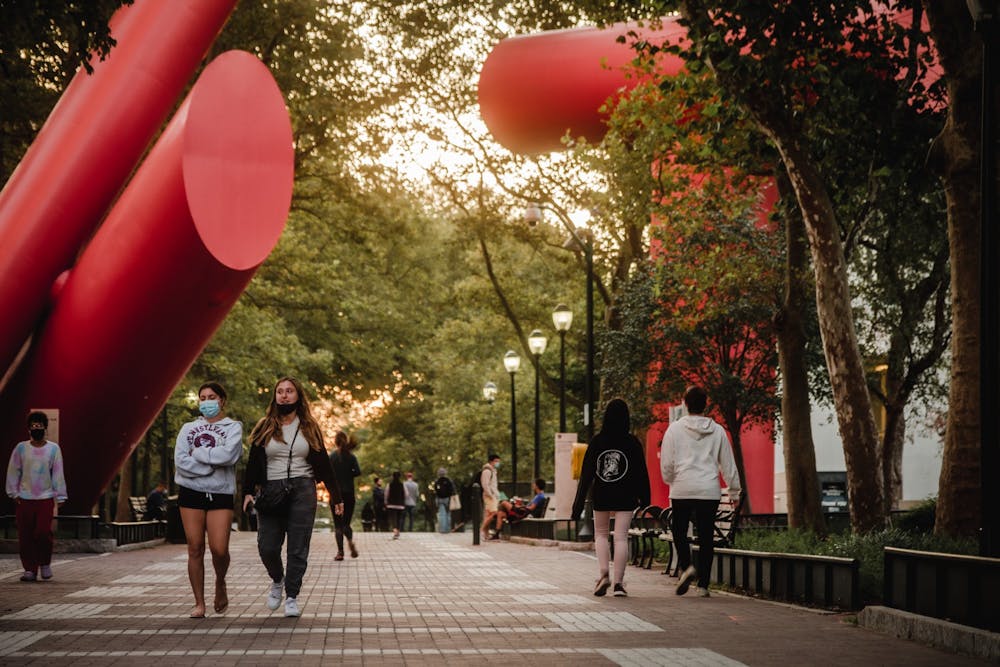
Penn's Wolf Humanities Center held an event featuring a sociologist and philosopher from the University of London to examine the role individual choice plays in mitigating the COVID-19 pandemic.
University of London professor Renata Salecl described the ways that choice is central to responding to the pandemic at the Nov. 18 virtual event. Most notably, she said, it is impacting the social choices people make in terms of interactions with and treatment of themselves and others.
Salecl began her address by explaining how the 2008 financial crisis impacted views of choice, a subject she explores in her 2010 book "The Tyranny of Choice." She said the crisis triggered talk about limiting extravagance and embracing simplicity, although this did not last.
“The idea of choice was very much a powerful ideological tool of consumer society. Again, we were thinking about ‘everyone can make it, if only I make the right choices.’ So we didn’t learn much from previous economic crises," Salecl said.
Despite continued economic anxieties, what Salecl described as the “neoliberal ideology” prevailed. Economic neoliberalism is a theory that supports maximized economic freedom for consumers and minimal state intervention.
The outbreak of COVID-19, however, reignited debates primarily over social choice, Salecl said. People now have the capacity to infect others with a deadly virus, making people's choices more impactful for others and potentially dangerous. Wearing a mask and social distancing are among these choices which some conservative or libertarian-leaning communities have viewed as a violation of individual liberty, despite being scientifically proven to mitigate the spread of COVID-19.
Salecl also discussed some of the most painful choices that may need to be made during the pandemic, not just by civilians, but also by healthcare providers. Salecl discussed the ethics of triage — sorting patients based on how crucially they need treatment versus their chance of benefitting from this care — in hospitals or how to make decisions when there are more sick patients than equipment to help them. She outlined four overall perspectives on the issue.
One approach emphasizes equality in treatment, and Salecl said some support a system similar to a lottery to decide the distribution of ventilators and other potentially limited lifesaving treatment. Another approach supports a first-come, first-serve method. Under this viewpoint, Salecl described how a 90-year-old who came to the hospital first would receive a ventilator over a 20-year-old who arrived second. The third approach prioritizes the most difficult cases.
Salecl said the most dominant triage method, however, is one of utilitarianism. Such approaches consider factors like life expectancy, chance of survival, and how irreplaceable a patient is. For instance, she gave the example of a single father being given treatment ahead of the CEO of a company because the father would be much more difficult to replace.
She emphasized, however, that these difficult choices do not occur often. Reality is much more clear-cut than this abstract theorizing, and even when such utilitarian measures are recommended in places like Italy, doctors do not always follow suit, she said.
Salelcl’s presentation was followed by remarks from Richard L. Fisher Professor of English David L. Eng.
Eng drew a comparison between choice during COVID-19 and the subjects of psychoanalysis and law. He connected the controversy around wearing masks in the United States to the West’s individualist culture and compared it to the widespread acceptance of masks in collective-centered Asia.
The event was part of the Wolf Humanities Center's theme for the 2020-2021 academic year — "choice." The Center's events this year will discuss the history and current relevance of decision making.
The Daily Pennsylvanian is an independent, student-run newspaper. Please consider making a donation to support the coverage that shapes the University. Your generosity ensures a future of strong journalism at Penn.
Donate






